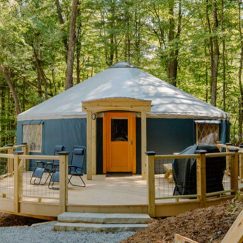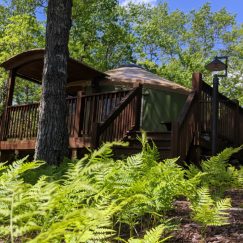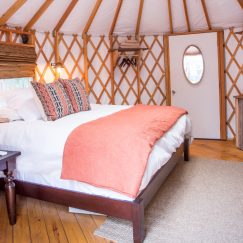Step Away From Your Electronics & Get Back to Nature in a Yurt
 American children spend an average of six hours a day in front of electronic media, according to Harvard Medical School. Today’s adults are also primarily indoor creatures; the EPA estimates that 90% of our time is spent inside. Fortunately, the panacea is all around us, in nature. Spending time in natural settings and parks can help offset the negative impacts of too much screen time.
American children spend an average of six hours a day in front of electronic media, according to Harvard Medical School. Today’s adults are also primarily indoor creatures; the EPA estimates that 90% of our time is spent inside. Fortunately, the panacea is all around us, in nature. Spending time in natural settings and parks can help offset the negative impacts of too much screen time.
Research from Netta Weinstein and others finds that lack of time in the natural world (mainly due to many hours spent in front of screens) leads to depression. Loss of empathy and lack of altruism are other proven outcomes of excess screen time.
The silver lining here is that we already have the solution—nature. Time in nature is inherently healing. Research shows that most people prefer natural environments when they’re feeling stressed. On some level, we recognize our need for nature. Recovery studies have found that even a single plant in a hospital room can reduce stress and anxiety.
We can heal ourselves through nature. Let’s take a look at a few of the many benefits of “going offline” by getting outside.
Health Benefits of Unplugging in the Great Outdoors
Improved Ability to Concentrate
Writing in 2001 for Environment and Behavior, Andrea Faber Taylor found that children with ADHD are better able to concentrate when they spend time in nature. Cornell researcher Nancy Wells has also conducted studies on children’s cognitive functioning; her research shows that children’s attention spans are positively correlated with time in nature. “By bolstering children’s attention resources, green spaces may enable children to think more clearly and cope more effectively with life stress,” explains Wells.
Increased self-discipline
Writing in a 2002 issue of the Journal of Environmental Psychology, Taylor found that children who spend more time in nature demonstrate increased self-discipline.
Improved motor fitness and immunity
Coordination, balance, and agility increase as children spend time in natural environments. Those children who spend time in nature also get sick less often, as Fjortoft and Sageie discussed in a 2001 edition of the Early Childhood Education Journal. Andrew Clark explained many other benefits of outdoor exercise in his recent article as well.
Better Eyesight
As reported in Optometry and Vision Science, children who spend more time outdoors have better vision than children who play primarily indoors.
Reduced Stress
A 2003 study by Nancy Wells found that children who are exposed to nature are more resilient. Wells concludes, “more [green landscape] appears to be better when it comes to bolstering children’s resistance against stress or adversity.”
More Vitamin D
The American Academy of Pediatrics warns that many children have Vitamin D deficiencies. This important nutrient helps prevent many health problems, including osteoporosis, depression, stroke, cancer, heart disease, and diabetes. Vitamin D may be taken as a supplement—or you can get it for free in sunlight.
These benefits are not restricted to children. From obesity to Alzheimer’s, time in nature is beneficial for many different adult health conditions. Overall health improves as we spend more time in natural settings.
The requisite preparation prevents many urbanites from going camping. Yurt camping is the perfect solution. It’s comfortable, convenient, and requires far less work than tent camping. Not ready to buy a yurt? No problem. State and private campgrounds across the country offer yurt camping. There’s nothing quite like kicking back in a cozy, circular structure to get away from stressful modern life. Take in nature and unplug from electronics—reserve a yurt camping spot today.






